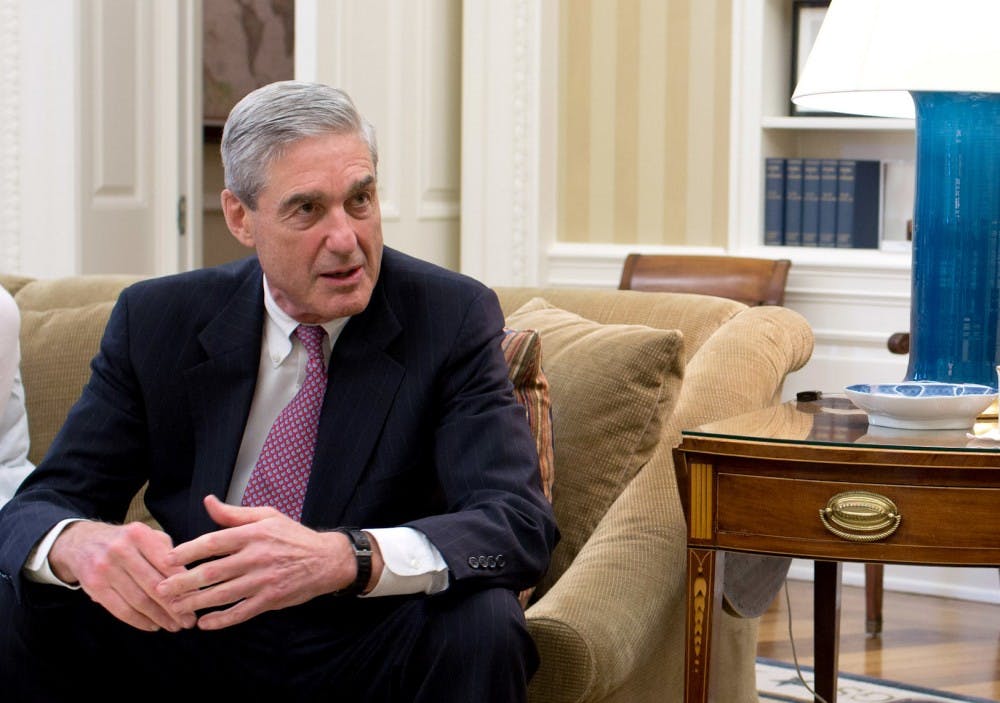On Friday, March 22, Special Counsel Robert Mueller ’66 delivered his long-awaited report on Russian interference in the 2016 presidential election. The report emphasized that the Special Counsel neither alleges the president committed a crime nor fully exonerates him.
The report came after nearly two years of investigation into the 2016 election. Prior to its conclusion, Mueller’s investigation received extensive media coverage.
As Mueller filed charges against several people associated with Trump in 2017, including Trump’s former campaign chairman Paul Manafort and former National Security advisor Michael Flynn, news of the ongoing investigation stirred an often-contentious national debate over the president’s ethics.
While many lawmakers continually praised the investigation as a democratic and necessary check on government power, some criticized it as politically motivated. Trump frequently fed into this debate by referring to the investigation as a “WITCH HUNT!” on Twitter.
On Sunday, Attorney General William P. Barr made a summary of the report public.
The report summary stated that the Special Counsel found two main Russian efforts to influence the 2016 election.
The first was by the Russian organization Internet Research Agency (IRA), which sought to “sow social discord” by publishing disinformation on social media sites. The second was by the Russian government, which hacked into computers to “gather and disseminate information to influence the election.”
According to the report summary, these hackers stole emails from Hillary Clinton’s campaign and organizations of the Democratic Party and published them on various platforms such as WikiLeaks.
The report summary noted that it had charged several Russian infiltrators in connection to these events, but that it did not find that anyone associated with the Trump campaign “conspired or coordinated” with the IRA or the Russian government.
In a second section, the report summary noted that the Special Counsel also investigated concerns that Trump’s actions constituted an obstruction of justice. It stated that the Special Counsel “did not draw a conclusion — one way or the other — as to whether the examined conduct constituted obstruction.”
According to the summary, the Special Counsel “leaves it to the Attorney General to determine whether the conduct described in the report constitutes a crime.”
Barr then explained in the summary that he and Deputy Attorney General Rod Rosenstein decided not to charge Trump with obstruction of justice. He emphasized that this decision was made due to lack of evidence rather than consideration of legal privileges to which a sitting president may be entitled.

Recent discussion of impeachment has often cited the need to wait for the findings of Mueller’s report. However, the anti-climactic result — the report’s inconclusiveness and Barr’s decision not to charge the president — may stall or altogether obviate plans for impeachment.
Charles Cameron, professor of politics and public affairs at the University, wrote to The Daily Princetonian in an email that impeachment is “off the table.”
“If the report had been more damaging for the president, House Democrats would have been compelled to move ahead with impeachment,” he wrote.
He added that the report’s findings represents only a short-term gain for the president, who will now face “two years of daily damage control with no obvious wins in sight.” On the other side, he noted that Democrats hopeful to regain the White House in 2020 “will have a solid chance of winning the referendum [on Trump]” in 2020 by “sticking to their knitting — investigating bad behavior and selecting the strongest possible nominee.”
Paul Frymer, who teaches politics and directs the Program in Law and Public Affairs at the University, also framed the findings as a short-term success for the president. In an email to the ‘Prince,’ he wrote that it would be merely speculative to predict long-term consequences until the full report is released to Congress or the public.
“It is certainly possible (and likely) that Democrats will interpret the report differently than the Attorney General who was appointed by President Trump,” Frymer wrote.
He also directly called the report’s conclusion into question, arguing that the president “succeeded in setting a very high bar for the [Mueller] Report — needing to show actual "collusion,” something that is very hard to prove.” He added that this higher standard makes it “not terribly surprising that the Report did not find collusion.”








